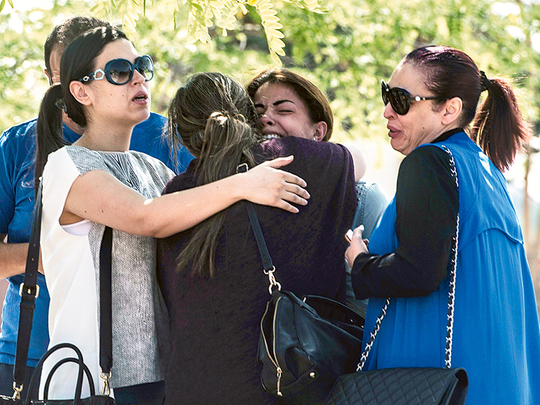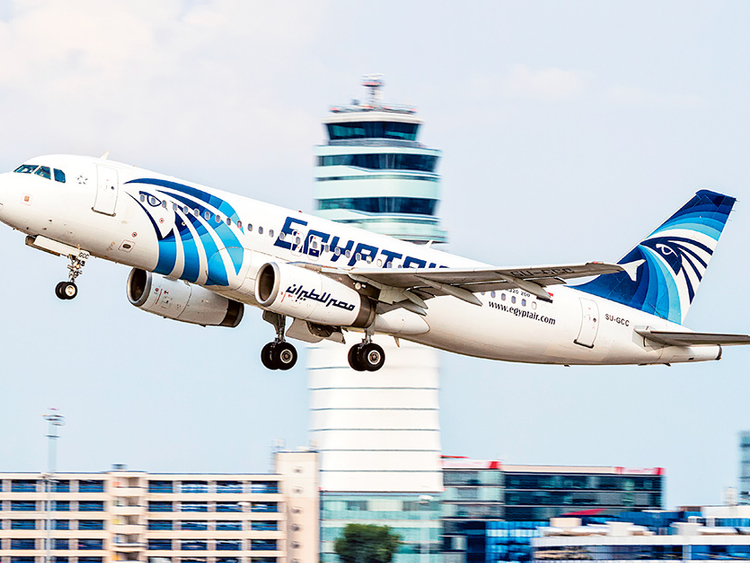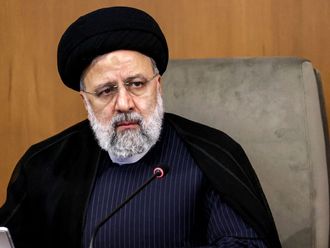
Cairo: Emotionally shocked and wearing black and other dark clothes, a stream of relatives were whisked by security guards into a designated area near Cairo airport. They had just learnt that their relatives were among the 66 who died when an EgyptAir plane crashed early on Thursday morning in the Mediterranean Sea on a routine flight from Paris to Cairo.
They had travelled from across Cairo and beyond, hoping to get any news on the fate of their loved ones.
Five who died were from the Nile Delta province of Gharbia, an airport source told Gulf News.
Some female relatives of the victims cried audibly as tears welled down on cheeks of others as they headed into an EgyptAir building, too exhausted to talk to a throng of media.
“Have mercy on us,” said a grief-stricken woman in her late forties as she was escorted by a male relative into the building. “We have got enough,” she told the media.
What is known is that all on board the EgyptAir Airbus 320 died after the flight disappeared from radar around 2.45am.
Wednesday afternoon, an Egyptian search plane located two orange items believed to be from the EgyptAir flight, 400 kilometres southeast of Crete within the Egyptian area of Flight Information Region, a Greek military official said.
In Cairo, Civil Aviation Minister Sharif Fathi told a news conference that he did not want to prematurely draw conclusions, but that indications suggest a terror attack as the more likely cause of the crash.
The crash also renewed security concerns surrounding Egyptian planes and airports, and brought back still fresh memories of the horrific Russian passenger plane crash in Sinai last October, when all 224 people on board were killed. Moscow has said the aircraft was brought down by an explosive device, and a local branch of Daesh claimed responsibility for planting it.
Greek defence minister Panos Kammenos said the MS804 made abrupt turns and suddenly lost altitude just before vanishing from radar at around 2.45 am Egyptian time.
He said the aircraft was some 30 kilometres inside the Egyptian Flight Information Region, and at an altitude of 37,000 feet. “It turned 90 degrees left and then a 360 degree turn toward the right, dropping from 38,000 to 15,000 feet and then it was lost at about 10,000 feet,” Kammenos added.
EgyptAir said the Airbus A320 vanished 16 kilometres after it entered Egyptian airspace, around 280 kilometres off Egypt’s coastline north of the Mediterranean port city of Alexandria. The carrier’s account fits closely with an account from Konstantinos Lintzerakos, director of Greece’s Civil Aviation Authority.
The airline said the Egyptian military had received an emergency signal from the aircraft, an apparent reference to an Emergency Locator Transmitter, a battery powered device designed to automatically give out a signal in the event of a sudden loss of altitude or impact.
The Egyptian military denied it had received a distress call and a newspaper quoted an unidentified airport official as saying the pilot did not send one. The absence of a distress call suggests that whatever sent the aircraft plummeting into the Mediterranean was both sudden and brief.
The head of Greece’s air traffic controllers association, Serafeim Petrou said everything was operating normally prior to the plane’s disappearance from radar.
French Foreign Minister Jean-Marc Ayrault offered to send military planes and boats to join the Egyptian search for wreckage.
“We are at the disposition of the Egyptian authorities with our military capacities, with our planes, our boats to help in the search for this plane,” he said. He spoke after French President Francois Hollande held an emergency meeting at the Elysee Palace.
Those on board, according to EgyptAir, included 15 French passengers, 30 Egyptians, two Iraqis, one Briton, one Kuwaiti, one Saudi, one Sudanese, one Chadian, one Portuguese, one Belgian, one Algerian and one Canadian. Ayrault confirmed that 15 French citizens were on board.
Egyptian authorities set up two medical clinics to offer medical assistance to relatives of the victims. One facility was set up inside the EgyptAir building, a second was operated in a nearby hotel.
“Medical help was offered to nine people, who suffered from fatigue, nervous breakdown and faintness,” said Medhat Qandil, the head of the Quarantine Service at Cairo airport.
Security has been enhanced around the airport since the early hours of the day. Authorities said that the air traffic had not been affected by the tragedy.
Some 116 EgyptAir domestic and international flights were scheduled for Thursday. Forty-eight of them, including a Paris-bound flight, left Cairo by midday, according to the airline.
— With inputs from agencies











